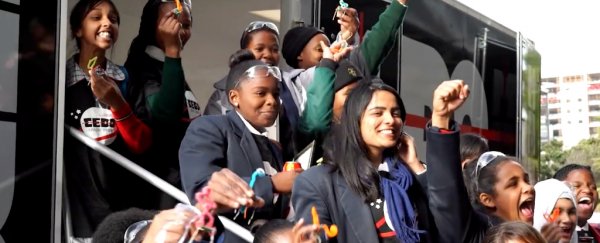In May next year, Africa will launch its first-ever private satellite into space, to monitor the continent's shifting weather conditions.
Unlike most private satellites out there, this one has mostly been built by 14 South African teenage girls, as part of a high school science, technology, engineering, and maths (STEM) boot camp.
The students have designed and made the payload for the satellite, which will orbit over Earth's poles and scan the surface of the African continent.
The satellite's payload will send back detailed thermal imaging data twice a day to help disaster prevention and improve food security in the region.
"We can try to determine and predict the problems Africa will be facing in the future," Brittany Bull, a student at Pelican Park High School in South Africa who worked on the payload, told CNN.
"Where our food is growing, where we can plant more trees and vegetation and also how we can monitor remote areas … We have a lot of forest fires and floods but we don't always get out there in time."
The satellite itself was bought by South Africa's Meta Economic Development Organisation (MEDO), and the students are being trained to make its payload by satellite engineers from Cape Peninsula University of Technology.
In their initial training, the girls programmed and launched small CricketSat satellites using high-altitude weather balloons.
But they've since moved on to programming the satellite payloads, which will be able to collect thermal imaging data and show where drought and floods are expected.
That's important, because an El Niño induced drought in April this year led to southern Africa producing 9.3 million tons [8.4 million tonnes] less corn than usual - as a result, South Africa will have to import more maize to make up for the shortfall.
"In South Africa we have experienced some of the worst floods and droughts and it has really affected the farmers very badly," one of the team, Sesam Mngqengqiswa from Philippi High School, told CNN.
"We expect to receive a good signal, which will allow us to receive reliable data … It's a new field for us [in Africa] but I think with it we would be able to make positive changes to our economy."
Mngqengqiswa is pictured below (centre) with Ayesha Salie (left) and Bhanekazi Tandwa (right).
If all goes according to plan, the satellite is scheduled to launch in May 2017, which will make it the first satellite to be launched into orbit by an African private company.
The group also wants to expand to involve girls from Namibia, Malawi, Kenya, and Rwanda as a way of inspiring young African women to work on STEM fields.
Many of the girls involved have bigger plans though, such as making it into space themselves - something no black African has ever done before.
"Discovering space and seeing Earth's atmosphere, it's not something many black Africans have been able to do, or do not get the opportunity to look at," Mngqengqiswa told CNN. "I want to be able to experience these things."
"I want to show to fellow girls that we don't need to sit around or limit ourselves," added Bull. "Any career is possible - even aerospace."
You can see the girls working on the satellite payload below:

